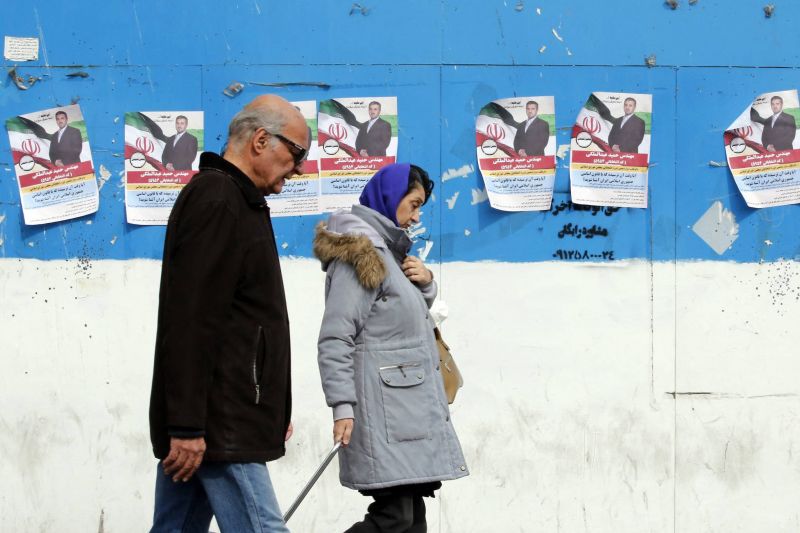
A man and a woman walk past electoral campaign posters bearing portraits of a parliamentary candidate during the first day of election campaigning in Tehran, on Feb. 22, 2024, ahead of next month's elections. (Credit: AFP)
Candidates running for seats in Iran's legislature launched Thursday their election campaigns, one week ahead of polls expected to tighten conservatives' grip on power.
Voters are due to cast their ballots on March 1 to pick new members of Iran's parliament, as well as the Assembly of Experts, a key body in charge of appointing the country's supreme leader.
The upcoming election will be the first since months-long nationwide protests rocked Iran following the September 2022 death in police custody of Mahsa Amini, a 22-year-old Iranian Kurd.
She had been arrested earlier for allegedly violating the Islamic Republic's strict dress code for women.
Large billboards and election posters have sprung up in Tehran and other cities to announce the start of the campaigns, urging people to take part.
But the first official day of campaigning on Thursday did not see a large number of banners erected in favor of individual candidates or their coalitions.
Iran's supreme leader Ayatollah Ali Khamenei has urged people to head to the polling stations.
"Everyone should participate in elections," he said on Sunday. "It is important to choose the best person, but the priority is for people to participate."
Some 15,200 candidates have been approved by jurists in charge of the vetting process to compete for the legislature's 290 seats, according to the official IRNA news agency, a record figure since the 1979 Islamic revolution.
"Most of the candidates, particularly in small constituencies, are doctors, engineers, civil servants and teachers who are not affiliated with any political group," journalist Maziar Khosravi told AFP.
By allowing such a large pool of candidates to run, the government "wants to create local competition and increase participation" to help attract voters, he added.
Only between 20 and 30 of the reformist candidates who submitted applications have been approved to run in the upcoming election, reformist politicians said.
Iran's current parliament, elected in 2020, has been dominated by conservatives and ultra-conservatives after many reformists and moderates were disqualified.
The country at the time saw a voter turnout of 42.57 percent – the lowest since the Islamic revolution.
Candidates running for seats in Iran's legislature launched Thursday their election campaigns, one week ahead of polls expected to tighten conservatives' grip on power.
Voters are due to cast their ballots on March 1 to pick new members of Iran's parliament, as well as the Assembly of Experts, a key body in charge of appointing the country's supreme...